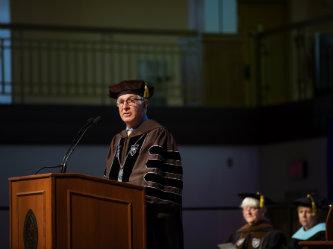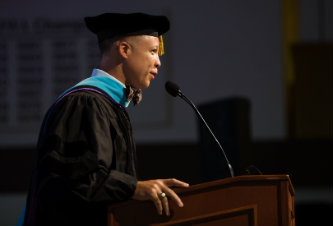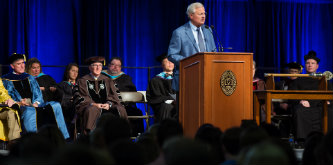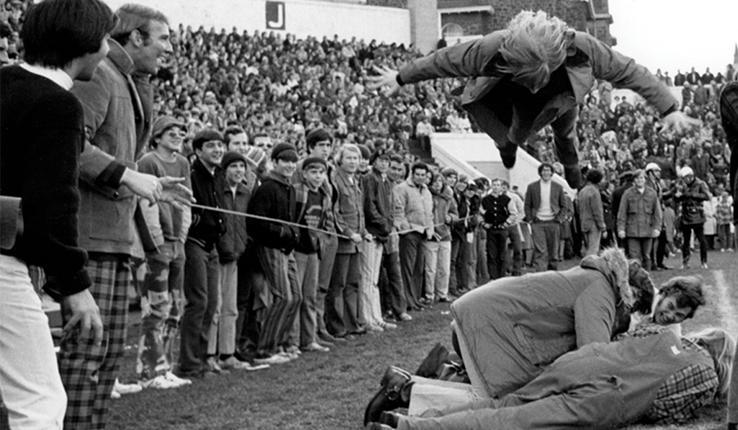Lehigh Convocation Opens Academic Year
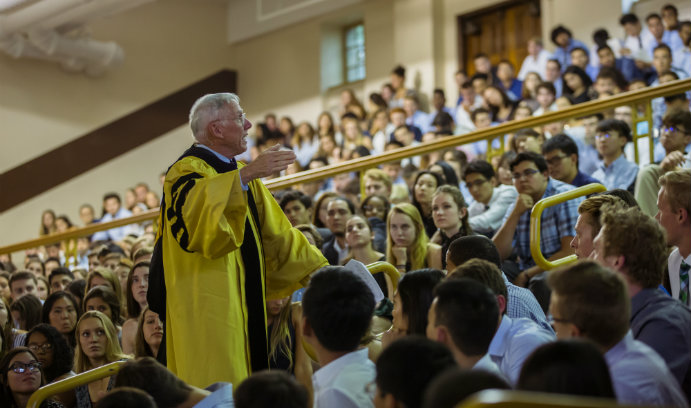
Economics Professor Frank Gunter delivered the keynote at Sunday's Convocation. “Your four years at Lehigh should be the great adventure of your life,” he told the Class of 2021.
President John D. Simon officially welcomed the Class of 2021 to Lehigh at Sunday’s Convocation in Grace Hall, encouraging them to acquire as much knowledge as possible, to read voraciously, respect other people’s opinions and use a little humor, if necessary, to diffuse a heated exchange.
“It’s no secret that this is a challenging time in our nation’s history,” said Simon, acknowledging the recent violent clashes in Charlottesville that led to one death and scores of injuries. Hatred, rage and violence, he said, are no substitute for meaningful dialogue.
“Universities have an important role to play in times like these, namely to give voice to the next generation, to enable them to engage around contentious social issues through peaceful means and to work toward a more just society and a better world,” Simon said. “You are the next generation of whom I speak. It is your time to find your voice.”
The Convocation marked the official start of Lehigh’s 2017-2018 academic year. The program began with an invocation from the Rev. Lloyd H. Steffen, university chaplain and professor of religion studies, a welcome from Ric Hall, vice provost for Student Affairs, and greetings from Bethlehem Mayor Bob Donchez and Provost Patrick V. Farrell. Economics Professor Frank Gunter delivered the keynote.
“At Lehigh, we will help you learn how to think,” Simon said. “We’ll never tell you what to think.”
To that end, Simon advised the students to anticipate differences of opinion. He pointed out that they will routinely come into contact with people who think differently than they do, not only other students and professors in the classroom but also people they will meet at social gatherings and off campus in the Bethlehem community. And the tone of the conversation will not always be friendly. “It’s how you conduct yourself in these situations that make the difference,” he said.
“Knowledge is the ultimate tool in your toolbox. Get as much of it as you can,” Simon said, as he encouraged the students to read books that will broaden their views and take them on unimaginable journeys. He also advised them to be open-minded, listen to what others have to say and respect other people’s opinions. He said it’s ok to disagree, but to be aware of the impact words can have. The right laugh line at the right time can “be just the thing” to help diffuse an argument, he said.
“I urge you all to speak up, speak out, question things, offer your ideas, let your voice be heard,” he said.
Bethlehem Mayor Bob Donchez also addressed the recent tragedy in Charlottesville as he welcomed students to Lehigh and the city of Bethlehem. “We in Bethlehem condemn acts of racial hatred and bigotry and are deeply saddened by the loss of life and injuries suffered in Charlottesville,” he said.
He told the students the city is committed to their safety, but told them to use common sense. And he talked proudly of the renaissance under way in South Bethlehem since Bethlehem Steel’s closing. He encouraged the students to step off campus, sample the restaurants and experience the nearby art venues and festivals, such as Musikfest, each year.
‘What is a good life?’
Keynote speaker Frank Gunter told the students that one of the values that Lehigh will try to impart will be the capacity for critical thinking—the ability to analyze a problem and come up with a solution. That involves three steps, he said: knowledge first, then analysis, then judgment.
“If you make your judgment before the knowledge, before the analysis, then there’s a high probability you’re going to say something stupid,” Gunter said. “And there’s a low probability you’re going to say something harmful and dangerous.”
He acknowledged the challenge of making judgments, especially if issues of morality and other people are involved, and he said the process can often make people uncomfortable. While there may be several cycles of gathering knowledge and making analyses, decisions will ultimately have to be made in most cases, he said, whether that’s to change majors, marry or vote for governments. Over the course of the next four years, he said, students may find themselves in disagreements with themselves, and by the time they’re seniors, they may find that they think differently about issues and other matters.
His nightmares, he said, aren’t about being chased by dragons in Game of Thrones, but rather reliving bad decisions that he made and remaking those same bad decisions. He said there are three ways to improve the capability of becoming a critical thinker: Choose to live in a wider world, read fiction in which the characters face moral dilemmas, and practice.
“You can’t pick up a violin at age 14 and end up the first violin for the New York philharmonic a year later, at age 15,” he said. “You can’t take my principles of economics course at age 18 and get an A, and end up at age 19 as a member of the Board of Governors of the Federal Reserve. No, you have to practice. You have to practice. And that’s what the four years of Lehigh is going to be.”
In encouraging the students to read more fiction, Gunter advised they find an author who speaks to them and who deals with moral issues. He said that’s a way of practicing moral thinking and making judgments without people getting hurt or making the wrong decisions.
“Your four years at Lehigh should be the great adventure of your life,” he said. “It will change you. It will hopefully change you in a better way, but it will change you.”
He left students with an important question to contemplate, one that he said was probably going to take them four years—and maybe the rest of their life—to answer, but one that he felt they should start thinking about as they begin their Lehigh journey: “What is a good life?”
The Lehigh University Choir, under the direction of Steven Sametz, the Ronald J. Ulrich Chair in Music, followed with the song, "If I got my Ticket, Can I Ride?"
Prior to the keynote, Farrell told the students that the next four years are a “spectacular time” to reinvent themselves. But he also challenged the students to commit to something important. Though commitment will invite risk—of failure, of embarrassment, of changing their mind—it will pay back in ways that can’t be measured, he said.
“Self-actualization is a wonderful thing,” said Farrell, “but it won’t help a nation and a world struggling with polarization, a troubled history of racial and ethnic strife, a dramatically different economy from what recent generations experienced, environmental challenges, persistent food and health care shortages in many parts of the world, seemingly endless civil wars that destabilize and impoverish parts of the world.
“Lehigh is not a place to hide,” he told them. “It’s a place to get ready.”
To read President John D. Simon's full remarks, go here.
To read Bethlehem Mayor Bob Donchez's full remarks, go here.
To read Lehigh's Principles of Equitable Community, go here.
Posted on:


